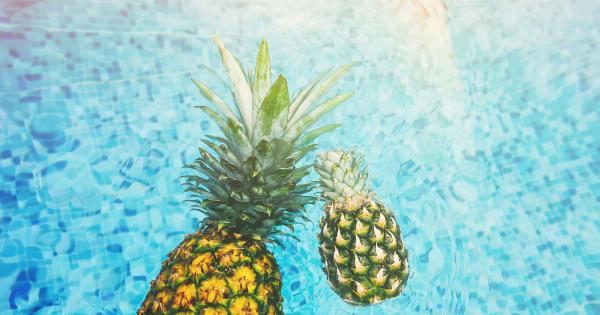Swimming is a fantastic exercise that offers numerous physical and mental health benefits.
Whether you’re a dedicated competitive swimmer or someone who enjoys swimming as a leisure activity, it’s important to fuel your body properly with the right nutrients before and after your swim sessions. In this article, we will explore the ideal pre and post-swim meals that will optimize your performance and aid in the recovery process. Let’s dive in!.
The Importance of Pre-Swim Nutrition
Before hitting the pool, it’s crucial to consume a balanced meal that will provide you with sustained energy throughout your swimming session.
The right combination of carbohydrates, proteins, and fats is essential to power your muscles and enhance your overall performance.
Pre-Swim Meal Ideas
Here are some excellent options for pre-swim meals:.
1. Oatmeal with Fresh Fruits
A bowl of oatmeal topped with fresh fruits such as bananas or berries is an excellent choice. Oats provide a slow release of energy, while fruits offer essential vitamins and minerals to support your body during the swim.
2. Whole Wheat Toast with Peanut Butter
Whole wheat toast is a great source of complex carbohydrates, and when coupled with peanut butter, it adds a dose of healthy fats and proteins. This combination is not only delicious but also provides lasting energy.
3. Greek Yogurt with Nuts
Greek yogurt is rich in protein, which aids in muscle recovery. Add a handful of nuts like almonds or walnuts for some healthy fats. This combination is perfect for both endurance and strength training sessions in the pool.
4. Veggie Omelet with Avocado
An omelet packed with vegetables is an excellent choice for a protein-rich pre-swim meal. Adding avocado provides healthy fats that can help sustain your energy levels during a longer swim.
5. Smoothie with Spinach and Protein Powder
If you prefer a lighter pre-swim snack, a smoothie can be a great option. Blend together fresh spinach, your choice of fruits, and a scoop of protein powder for an easily digestible and nutrient-dense meal.
The Role of Post-Swim Nutrition
After completing your swimming session, your body needs proper nutrition for a speedy recovery and to replenish the lost nutrients. Consuming the right post-swim meal will aid in muscle repair and reduce the risk of fatigue.
Post-Swim Meal Ideas
Here are some delicious post-swim meal ideas:.
1. Grilled Chicken or Fish with Quinoa
Lean proteins like grilled chicken or fish paired with quinoa make for an excellent post-swim meal. These foods are high in essential amino acids, which are vital for muscle repair and growth.
2. Whole Grain Pasta with Tomato Sauce and Vegetables
Whole grain pasta offers complex carbohydrates for replenishing energy stores. Top it with a tomato sauce loaded with vegetables like bell peppers, mushrooms, and spinach to enhance the nutritional value.
3. Sweet Potato and Black Bean Burrito
Sweet potatoes are a fantastic source of carbohydrates and are packed with vitamins and minerals. Combine them with black beans in a burrito for a satisfying post-swim meal that helps restore glycogen levels.
4. Salmon Salad
Salmon is rich in omega-3 fatty acids, which aid in reducing inflammation and promoting muscle recovery. Prepare a delicious salad with fresh greens, grilled salmon, and a light dressing for a refreshing and nutritious post-swim meal.
5. Fruit and Yogurt Parfait
A fruit and yogurt parfait is a quick and easy post-swim snack. Layer Greek yogurt with your favorite fruits and some granola for a blend of protein, carbohydrates, and healthy fats.
Important Considerations
When planning your pre and post-swim meals, it’s essential to remember the following:.
1. Hydration
Stay hydrated before, during, and after your swim. Water should always be your go-to beverage, but you may also consider incorporating a sports drink for longer and more intense sessions to replenish electrolytes.
2. Timing
Eat your pre-swim meal 1-2 hours before your swim to allow digestion. For post-swim meals, aim to eat within 30 minutes to 1 hour after your swim for optimal recovery.
3. Personal Preferences and Dietary Needs
These meal suggestions are a starting point, but it’s essential to cater to your individual taste preferences and any dietary restrictions or considerations you may have. Consult a registered dietitian for personalized advice.






























